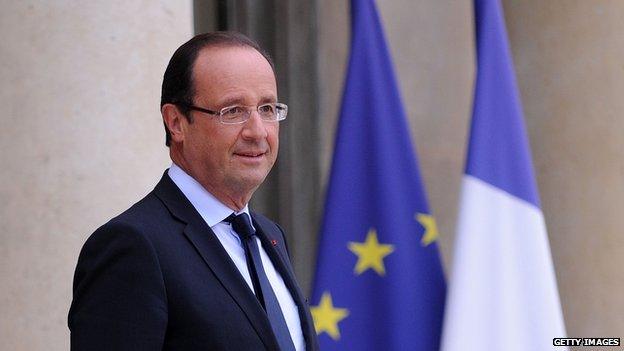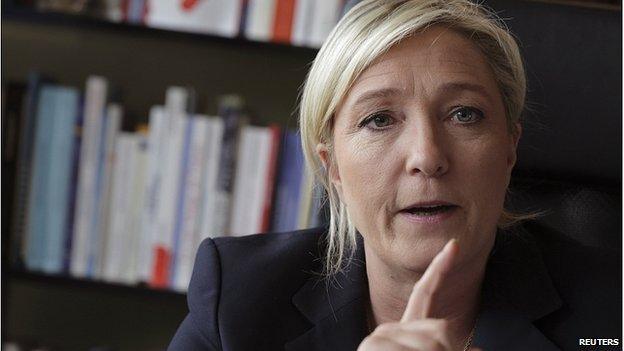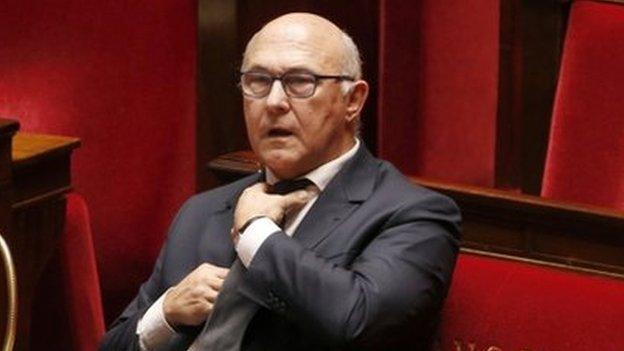French 'mess' threatens real civil strife
- Published

The Hollande presidency is not popular
To grasp the extent of the shambles, external that is French politics today, take the story of the "eco-tax".
It could be a case study in how to induce paroxysms of voter fury.
The eco-tax was a levy, agreed on by all France's main parties, which would charge goods vehicles for using the roads. The money raised would help fund infrastructure and encourage other, cleaner, means of transport.
But some French people decided they didn't like it. They tore down the metal bridges where cameras for road-monitoring had been installed. They threatened to march on Paris.
The Socialist government, whose ministers had previously extolled its virtues, suspended the eco-tax. Then they binned it for good.
The end result is this. The private company contracted to organise the tax is claiming 1bn euros in damages from the state. It has built a nationwide grid of electronic monitors - destined now to rust - and employs hundreds of people.
At the same time, the money that would have been gathered from the tax - some 400m euros a year - is missing from the budget.
To replace it, the government has ruled that the price of diesel will go up - for all drivers. In other words, ordinary householders will foot part of a bill that was intended for the big polluters.
As for the rest of the shortfall, the government is casting about for ideas. One day, Ecology Minister Segolene Royal calls for a tax on all foreign lorries that drive through France. The next, Finance Minister Michel Sapin scotches her proposal because it is against European law.
So there you have it - all the ingredients of a modern French mess.
A "noble" cause taken up by the Paris establishment, which then buckles with fear when confronted by the "street", reneges on its commitments and plumps yet another tax on ordinary folk - all the while publicly disagreeing about what on Earth to do next and invoking Brussels as a higher authority.
Widespread pessimism
As the Hollande presidency stumbles past its half-way poin, externalt, it is hard to overstate the depths of pessimism in the country.
For the eco-tax fiasco was not an unlucky one-off. It typifies perfectly the melange of incompetence, powerlessness, timidity and indecision to which the country's government has fallen prey.
To be fair, just about every French government of the past 30 years could be accused of similar shortcomings. L'immobilisme - basically a pride in the French model and a resulting failure to react to the world outside - began under Francois Mitterrand.
But now the crisis is deeper, external. The public accounts are close to ruin and yet state spending is still not coming down in any significant way. Unemployment is at 11% and yet the labour market is still not being put through serious reform. The young and the ambitious continue to look abroad.

Marine Le Pen is thought to stand a chance of becoming president
And to cap it all, France has in Francois Hollande a leader who is about as far as is possible from being the man-of-the-hour.
The president makes a boast of being "normal", when the times require exception. He invites ridicule, when France needs someone of stature. He vacillates, when France looks for steel.
President Hollande said he loathed finance, when that was the expedient thing to do. Afterwards, he discovered the virtues of business, and appointed a former Rotchschild banker to run the economy.
Foolhardy indeed to conjecture what the president actually believes in.
Writing recently, veteran political commentator Alain Duhamel described the crisis confronting France today as "the worst since World War Two". He is not the only one to feel that the country is heading for something very bad.
For Jean-Sebastien Ferjou, editor of the right-wing news website Atlantico: "The political situation today is completely unpredictable. Anything could happen."
On the left, Liberation newspaper's Daniel Schneidermann says: "The volatility means we cannot rule out trouble on the streets."
All scenarios, of course, centre round the far-right Front National (FN) - the party that has been by far the greatest beneficiary of both the economic crisis and the popular turning-away from establishment politics.

Economic woes:
Growth of 0.4% expected this year
Growth of 1% expected next year
4.4% budget deficit expected this year
Unemployment currently 11%

For Alain Duhamel, the possibility of FN leader Marine Le Pen actually being elected president - totally unthinkable a year ago - is now not beyond the realms of possibility.
His "devil's scenario" consists of President Hollande dissolving parliament early - next year some time - because of the economy's continuing slide. The centre-right Union for a Popular Movement (UMP) wins a majority in the assembly but predictably fails to make much difference.
With mainstream left and right "in it together", Ms Le Pen romps home in 2017.
An alternative version has Ms Le Pen facing up against the returned Nicolas Sarkozy in the decisive second round of the 2017 vote. Then some new judicial scandal - saved up for this moment by his many enemies - engulfs Mr Sarkozy, and he falls.
What would happen in the event of a Le Pen government is for most commentators too awful to contemplate. "The saying goes that in France you need 500 people to run the country," says Jean-Sebastien Ferjou.
"In other words every incoming government needs 500 loyal and competent place-men and -women to take over at the top of the administration. The FN has about 20."
But even if the country avoids this scenario, the omens are grim.
The reforms, which nearly everyone agrees are essential, will no doubt continue to come - but at the rhythm of a drip-feed and never enough to halt the economic slide.
Then what everyone fears is some external event - an interest rate hike that makes the national debt unpayable, an act of terrorism - and such has been the collapse of faith in politics, the country could be on the edge of genuine civil strife.
- Published15 October 2014

- Published29 August 2014